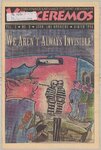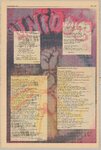| OCR Text |
Show Venceremos page seven 1996 NCDM Womens Committee and Womens Delegation TU Winter un “The body of a woman is also a battleground in this “new type” of war designed for extermination... We call upon all the men and women who in Mexico and the world struggle for democracy, liberty and justice, in order that we mobilize with regard to this fundamental demand for all human beings: respect for women.” —EZLN communiqués regard- ing attack on Cecilia Rodriguez, November 2 and 4, 1995 The National Commission for Democracy in Mexico (NCDM] has formed a permanent national women's committee to build awareness and support among women in the US for the Zapatista and indigenous women in Chiapas. The Committee was organized to support the resistance of women against the devastation of neo-liberal restructuring, especially in Mexico and the US, by combating the low-intensity warfare being directed at women in Chiapas. Through its development as a grassroots women's network in the US, the Committee is dedicated to raising public visibility of, and support for, the conditions and efforts of women in Chiapas' conflict zone and their linkages to women's issues in the US. Chaired by Raquel RubioGoldsmith, director of Chicano Studies at Pomo State Community College in Tucson and a member of NCDM's Coordinating Committee, the committee is open to individuals and organizations who want to build among women in the US: Understanding of the conditions of the Zapatista and indigenous women in Chiapas, particularly regarding the lack of justice and legal protection for women in Mexico Awareness of the linkages between conditions of women in Chiapas and women in the US (i.e. the impact of neo-liberalism) Resistance to the low-inten- sity war in Mexico and its particular targeting of women Opposition to US government and corporate involvement in the low-intensity war in Mexico and the Party-State dictatorship in Mexico Grassroots pressure to demand that national women leaders in the US support the women in Chiapas As part of its inaugural efforts, the National Women's Committee is organizing and sponsoring a Women's Delegation to Chiapas Sunday March 31 through Wednesday April 3, 1996. The delegation will visit with women, community and church leaders, human rights groups and Zapatista communities to learn about the conditions of women in the conflict zone in Chiapas, and to lay the ground work for ongoing efforts in the US in support of the women of Chiapas. It will be led by Cecilia Rodriguez, official US representative of the Zapatistas. In addition members of the Women's Delegation may extend their stay in Chiapas and participate as members of NCDMSs delegation to the Continental Encuentro in Chiapas Wednesday April 3Sunday April 7. For more information on the National Women's Committee and its Women's Delegation to Chiapas, please contact NCDMSs national office at: 601 N. Cotton Street, FA103 El Paso, Texas 79902 Phone/fax: (915) 532-8382 Email: moonlightQ0igc.apc.org Pm OK: Coming Home and Back Again » kamerine Salas In the late summer of 1958 my parents turned off Route 66 and drove another 50 miles north to Stillwater, Oklahoma. They'd arrived with two small daughters to live there while my father attended grad school. “T'd hate to be pregnant in this heat!” my mother announced. There's nothing worse than sticky heat and mosquitos around your ankles where you can't slap them. She'd tempted fate — and I was born in late July of the next year. - "We didn't stay long enough for my accent to take. We moved several times after leaving Oklahoma. Growing up as Air Force brats, my six sisters and I were isolated from other families like us, that is, Hispanic families. We began to "wonder if we were alone. Born in the Southwest, perhaps it was my fate to circle back years later on my own, like my father, to attend graduate school, this time in New Mexico. In the early 80s, 1 was searching for an identity I did not yet have. Now in the mid90s, l'm still here, living out life beyond the M.A. though my large extended family expected me to return “home” afterwards. Invariably the new kid, 1 grew up spelling out my last name, but it wasn't until l moved to Albuquerque that I learned I had been mispronouncing it all along. While attending the University of New Mexico, I studied under a famous author who taught me to say my surname correctly, softening the first vowel and sustaining it through the second. The famous author loved dramatic readings of our names and other works. 1 rattled the piñon he gave me in the palms of my hands. Who's in a name? At 24, I was beginning to find out.. Living and working in Albuquerque, the Spanish language began to rise around me like water that must be reckoned with. It permeated jokes, food, the names of places, one green dairy pastures edging up to the ocean, giant redwoods - posited just inland. Crime was for translation. negligible among the dairy My parents, both native farmers. In our small town, 1 Spanish speakers, had not never had to lock my car doors taught us—their seven daughor the door to our living quarters—Spanish. I have not met ters. But I suffered a worse sort one person who does not tsk tsk of assault at the college. this situation. But understand “Dirty Mexican, spic,” a colthat in the 1950s and 60s when league tormented me. He called my parents were parenting, me other names which I simply Spanish was associated with the cannot remember, racial slurs underclass, the uneducated. My which I had never heard before parents, ambitious for our or since. He wrote me bizarre advancement, did not want us letters in his own hand describto speak with a Spanish accent ing his hatred for me. or suffer the stigma that the Ultimately I was told by school language had brought them. and state administrators that a Even my cousins who grew up “reasonable woman” would tolin Albuquerque, their mother a erate his behavior. Spanish teacher in fact, did not I could not tolerate his hatred learn Spanish. of women, Hispanics, me. My After almost two years in husband and I fled California Albuquerque, I went to study in not knowing where we would Guadalajara for the summer live next. with a university program. At the time, there was a general Now, my family said, surely now, my husband and I would warning to U.S. citizens to stay have to consider returning out of the area because U.S. “home.” We could live with my drug enforcement agents had parents until we could recover been killed in the vicinity. ourselves financially. This all “Do you think we'll be all made sense, for their Rocky right?” I asked one of the other Mountain valley was growing students who was going on the and developing in ways none of program. us had predicted. “There's nothing to worry I knew I could never stay about,” he said, “We'll be OK.” I scrutinized his face for the when I looked out on a sea of blond heads in the grocery store truth. He was tall and winsome. where my mother shopped. I'd I believed him. Ten years later, I speak lived too long in Albuquerque— I was used to students and coSpanish functionally upon workers, friends and neighbors demand. I'm embarrassed to having all sorts of color of hair speak publicly—I suspect that and eyes. I was used to seeing people expect much more of my own eyes in the eyes of the me—but in truth l'm content accountant, the doctor, the that I can now understand conladies at Wal-Mart, the teacher. versations on a basic level. They affirmed me and told Occasionally I do surprise me—in Spanish and English— myself with a lucid response. who I was. Once I made a joke that We drove to Tucson in worked. January. My friend from grad In 1991, 1 was working for the school put us up in her spare federal government, and my bedroom. She toured us through husband, still tall and winsome, the university; raced us up and was completing a graduate prodown Speedway, circled through gram in Spanish. I missed teachdowntown and for some reason ing English and so I decided to took us to the Sosa-Carrilloaccept an offer with a commuFremont House. She kept up nity college on the far-flung two conversations, one with my northern coast of California. husband and one with me, proI taught against a backdrop of good long river. In stores, Hispanic women turned to me Write viding two sets of selling points. “Everything will be OK,” she told me. She'd moved to Tucson right after grad school to continue teaching. There was no heading back to our previous life. Behind us in Albuquerque, we'd cut off our jobs to spite ourselves. We were out of work in the thickest part of the economic recession. lt was a time to think beyond job opportunities. More than a livelihood, we needed to live. We were lured by palm trees and saguaros saluting us with their twisted arms. Near our friend's house we saw a coyote crossing through a stop sign. The desert was different than what we knew in New Mexico—different and intriguing. So we stayed in Tucson where we began with one good friend. We retrieved our goods from California and so our lives, though that took longer. We edged forward. Eventually we bought a home with reddish vigas defining the ceiling. Now in the mornings l awake under our beams, amazed that I live under them, for had 1 stayed “home” I would only be an imitation of someone else living under a pitched roof. Life in the Southwest has provided me with an affirmation of myself as an Hispanic, an affirmation I did not have as I was catapulted about the country by my father's career. Just months after we bought our house, as if part of the paperwork, we were married by the Catholic Church. It was during the bureaucratic process beforehand that 1 discovered I had been baptized in - Albuquerque in a parish 1 knew very well. My parents must have stopped on Route 66 to see my uncle and aunt, my godparents, in August of 1959. Of course. How many times we come home again. Katherine Salas is a graduate of the University of Utah. She received her M.A. from the University of New Mexico. She and her husband permanently reside in Tucson. There was no heading back to our previous life. Behind us in PS wed cut off our jobs to spite ourselves. We were out of work in the thickest part of the economic recession. It was a time to think beyond job opportunities. More than a livelihood, we needed to live. for Venceremos! Applications always taken. Stop by 240 Union, University of Utah. j j NT5 by David Tucker |










